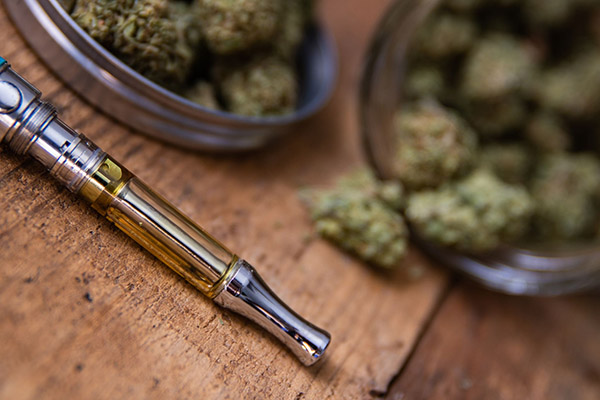Studies have shown that vaping marijuana gets you higher than smoking marijuana.
Scientists have shown that vaping marijuana gets you higher than smoking the same amount of weed.
The new study, led by scientists at the Johns Hopkins Behavioral Pharmacology Research Unit in Baltimore, tested the effects of smoking and vaping marijuana on 17 participants.
While the participants had previously smoked marijuana, none had done in the 30 days before the study started (on average, participants had smoked once in the previous year). Throughout six 8.5-hour sessions, these participants get very, very high, and all in the name of science.
The study was funded by the Substance Abuse and Mental Health Services Administration. Although in full disclosure, one of the study's authors reported that he had previously received fees from or consulted for companies with ties to marijuana.
Each session involved participants smoking or vaping a specified dose of marijuana which contained 0 mg, 10 mg, or 25 mg of tetrahydrocannabinol (THC), the psychoactive compound in marijuana.
Each participant ended up vaping and smoking each of the possible doses during their six sessions. To prevent bias, the tests were done blind. So the participants were kept in the dark as to which quantity of THC they consumed each time while filling out subsequent drug impairment questionnaires.
Participants took a series of physical and cognitive tests as well as self-reporting how they felt during each session. The participants had their heart rates and blood pressure measured ten times over eight hours and were asked to complete computer tasks. These tasks included replicating shapes on a screen, solving simple addition equations, and responding to two different stimuli simultaneously using a mouse and computer keyboard—the greatest of weed-enabled entertainment.
The results of these tests show, unsurprisingly, that taking a 25mg dose of THC makes you very, very high, regardless of if you're smoking or vaping it.
Following the 25mg dose, two participants vomited, and one experienced hallucinations.
Whether smoking or vaping, most drug effects peaked within the first hour. This included increased heart rate, dry mouth, red eyes, paranoia, and munchies.
In some cases, these effects didn't return to baseline levels for more than eight hours. Typically, these effects persisted for hours after participants' blood THC concentrations returned to normal.)
Overall, at each dose, vaping proved to have potent results.
"Vaporized cannabis produced significant increases in subjective drug effects, cognitive and psychomotor impairment, and higher blood THC concentrations compared to the same dose of smoked cannabis," the researchers concluded in the study.
Vaping cannabis resulted in significantly higher THC concentrations in the blood of participants than smoking cannabis.
When vaping cannabis, the participants made roughly twice as many errors on the cognitive tests and experienced more significant adverse drug effects, including dry mouth, itchy eyes, and paranoia, than when smoking cannabis.
In short: vaping make people higher. According to the researchers, the doses used weren't even that strong compared to what's commercially available.
The highest dose of cannabis administered in this study (25mg THC: 0.19 g; 13.4% THC) is much lower than the amount typically found in pre-rolled cannabis cigarettes. It has a lower THC concentration, as prerolls usually contain around 1 gram of cannabis, and THC concentrations often exceed 18%.
With recreational marijuana now legal in many U.S. states and all of Canada, it's important to remember that even moderate amounts of THC can have a significant impact on casual consumers and that not all methods of consuming marijuana are equal.




Comments
Post a Comment